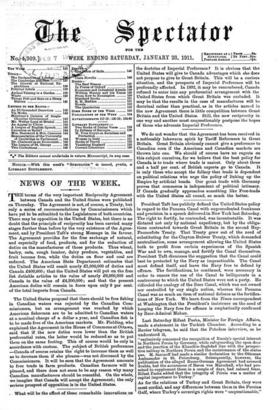President Taft has publicly defined the United States policy in
regard to the Panama Canal with unprecedented frankness and precision in a speech delivered in New York last Saturday. The right to fortify, he contended, was incontestable. It was dictated not only by national expediency, but by the obliga- tions contracted towards Great Britain in the second Hay- Pauncefote Treaty. That Treaty grew out of the need of substituting for the Clayton-Bulwer Treaty, which demanded neutralisation, some arrangement allowing the United States both to profit from certain experiences of the Spanish War and to own, manage, and fortify the Canal themselves. President Tait dismisses the suggestion that the Canal could best be protected by the Navy as impracticable. The Canal must defend itself, and leave the Navy free to defend by offence. The fortifications, he continued, were necessary in order to ensure the use of the Canal to belligerents in a controversy to which the United States were not a party. He ridiculed the analogy of the Suez Canal, which was not owned nor controlled by any single nation, whereas the Panama Canal was as much an item of national defence as the fortifica- tions of New York. We learn from the Times correspondent at Washington that the President's insistence on the need of keeping the Navy free for offence is emphatically confirmed by Rear-Admiral Mahan.






















































 Previous page
Previous page